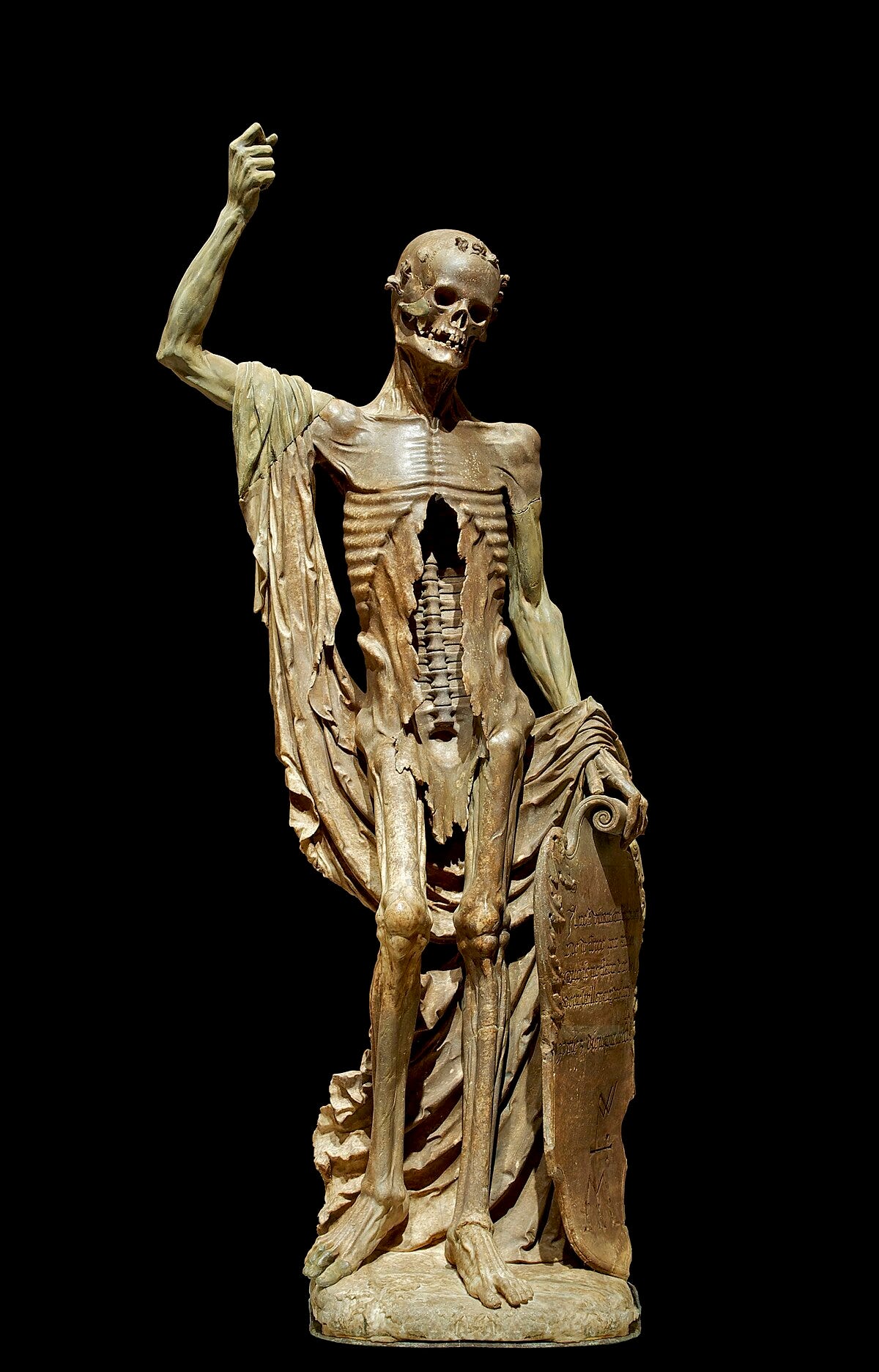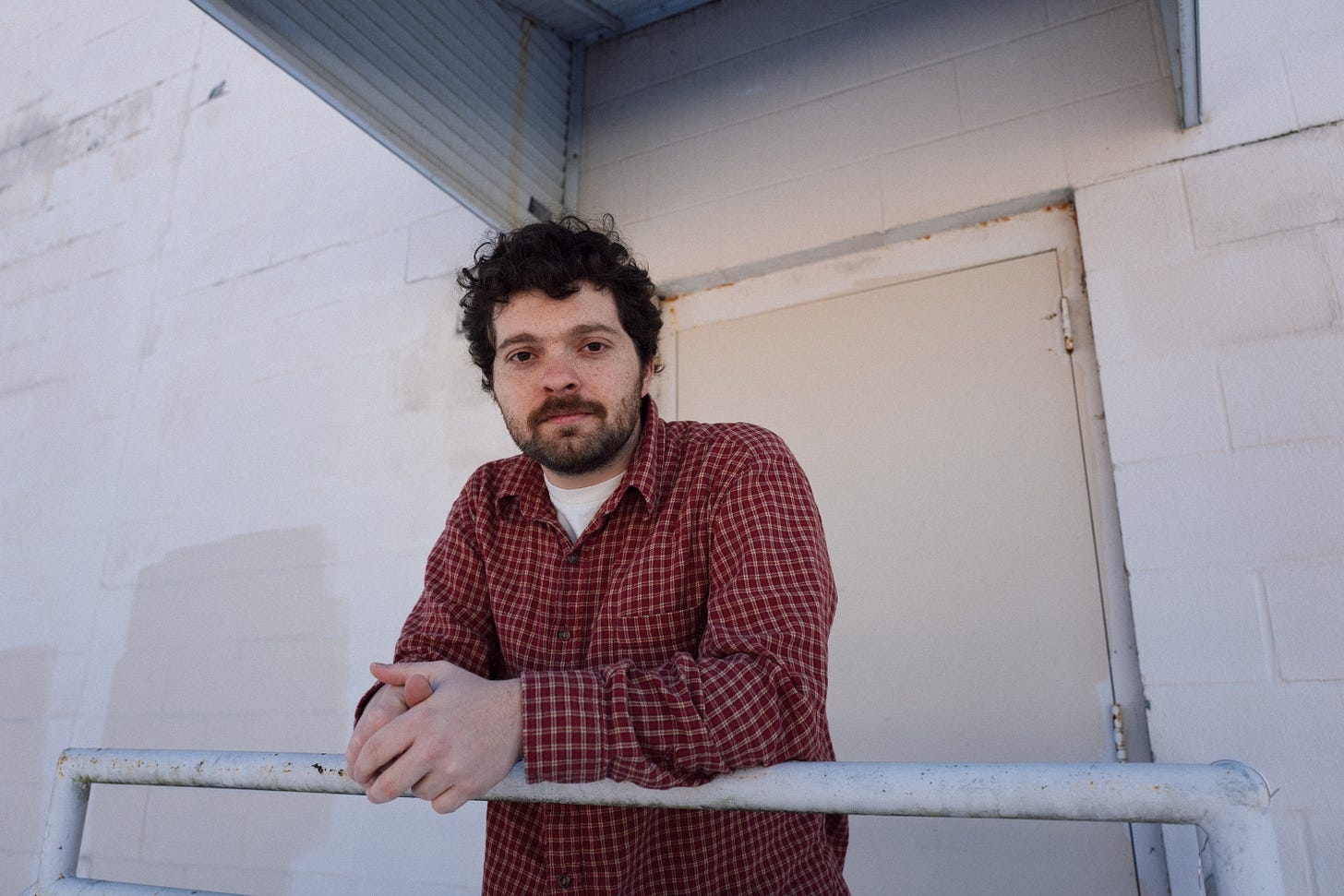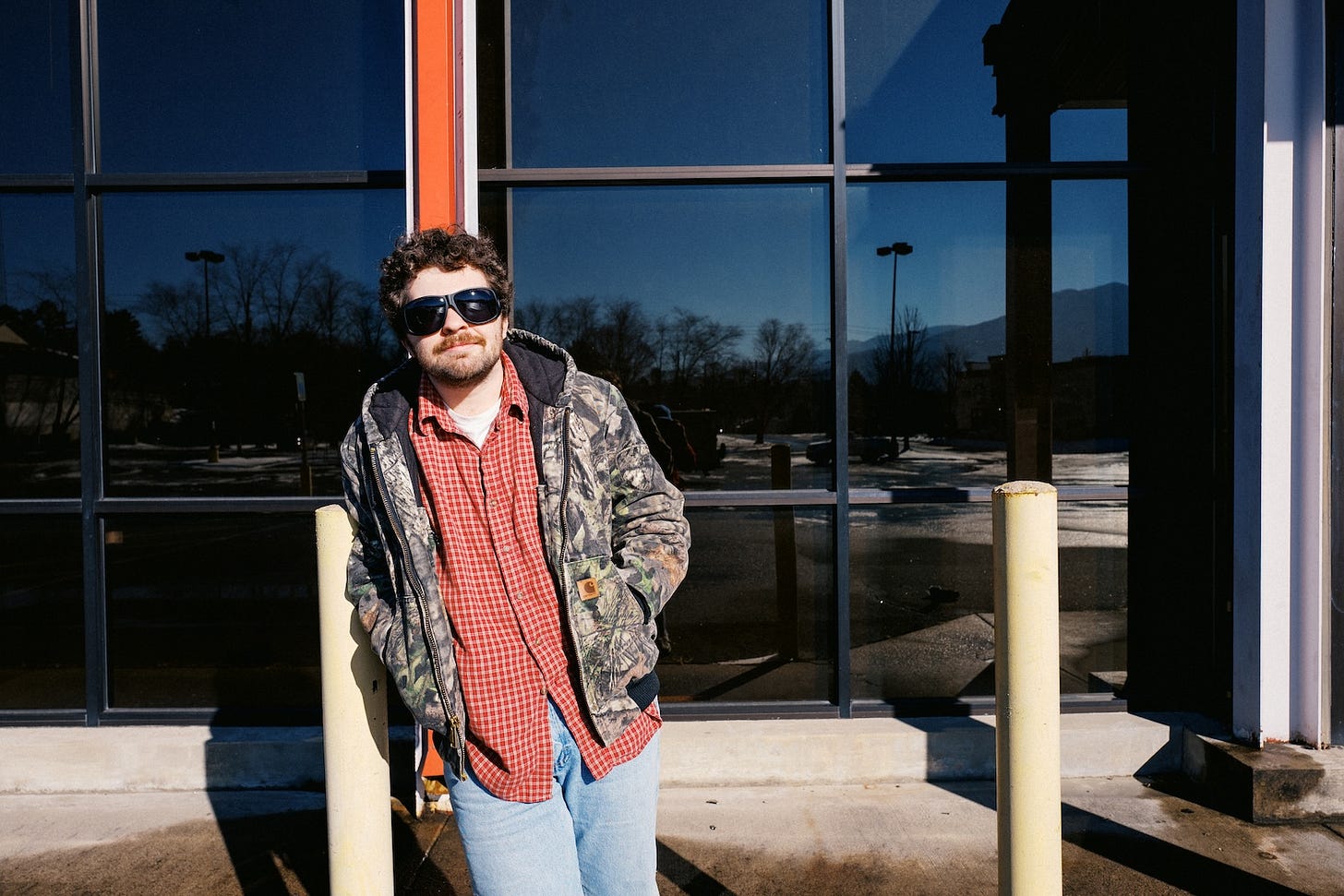Colin Miller: It’s fun to make meaningful nonsense
A conversation with the musician
Welcome to Human Pursuits, the column that features need-to-know names and stories in media and other creative spaces. Today, a conversation with musician Colin Miller.
Leah and I were in Paris last week when we were suddenly confronted with the prospect of our own mortality. We had just finished descending one of the Louvre’s many marble staircases when we happened across a statue of death in all its skeletal glory. Allégorie de la mort dite la mort Saint innocent. Death of the Holy Innocents.
A placard told us the statue once held an arrow and a shield, that it stood amongst the corpses in some long-forgotten Parisian cemetery. Somewhere along the way, it lost the arrow, but the shield remains, along with an inscription.
“There is no living man
No matter his talent
Who can resist my sting
And deny worms their meal”
We saw dozens of amazing statues that morning. But Allégorie de la mort dite la mort Saint innocent was the one we talked about most. Because it communicates what everybody knows, but hates to admit. That, regardless of skills or talent or money, we are destined to become worm food.
For all our nihilistic detachment, millennials and boomers rarely confront mortality in such precise terms. We YOLO our way into ten-dollar matchas and spontaneous trips to Turkey. But ask a table of your friends about the meaning of life, or what happens when we die, and the response is probably crickets.
I was reminded of this fact listening to Collin Miller’s Losin’, an album that I enjoy and recommend, as it stares death in the face and tries not to blink. Written after the passing of his friend and landlord, Gary, Losin’ finds Miller in the difficult position of trying to preserve a chapter of his life, knowing full well that it’s about to close. Recorded at Drop of Sun Studios and tapping into some of the same drawling sounds as bandmate MJ Lenderman, it’s a tender reminder that our losses are what make the wins worthwhile.
And so, we had much to discuss.
Our edited and condensed conversation started slightly off kilter, with me running behind schedule and Colin passing time by playing chess on his phone. We discussed his relationship with the game, his favourite players, and how chess has fallen victim to clickbait, before diving into Losin’, his relationship with Gary, the pros and cons of winning the lottery, and more.
ES: Thanks for hanging tight, man, it’s been a morning over here. I want to hear more about you playing chess. Laughs. Are you just playing on the computer?
CM: I just play on Chess.com on my phone. I had a subscription for a while. I’d do lessons or the little curriculum on the app. I was really into it last summer, but I’ve fallen off lately. I’m just getting back into it.
ES: The few times I play chess, it’s on my laptop. I’ve never taken a lesson. I always get creamed.
CM: Laughs. Playing against the computer is so brutal. It’s so much better than a person. It’s like a resistance band to work against to get better.
ES: How good are you, exactly? Do you know strategies and stuff?
CM: I researched it a little bit. I got into openings and was memorizing some classic moves. As I got deeper into it, I was like, “What am I doing this for?” Laughs. Maybe I should put that energy into getting better at drums…
ES: I feel like chess moves always have interesting names. Is there any lyrical or songwriting potential there?
CM: I used to know them, but my brain has dragged those files to the trash. The only ones I remember are the ones I never used. Like ‘the London System’.
ES: That’s a great one.
CM: It sounds like a new wave band.
ES: Or post punk. I promise, I’m not just going to ask you about chess, but do you have a favourite player?
CM: No, I never got that deep into it. I watched some Magnus Carlsen videos, but he’s not a fave. The vibe around chess right now is so clickbait-y. Like “Watch so-and-so destroy so-and-so in TWO moves”. It’s probably always been like that to an extent, but with the Internet, it’s more obnoxious. I just want it to be a game on my phone. It doesn’t have to have this whole gossip personality attached to it.
ES: I imagine they must be struggling to get younger people into it. The clickbait probably helps with that.
CM: Big time. It’s trying to hold the attention of everyone who got into it during the pandemic.
That’s been a big thing for me: feeling comfortable in my own skin and making what sounds good to me, and trusting my gut.
ES: Where are you right now, by the way? North Carolina?
CM: No, I’m in New York with MJ Lenderman and the Wind. We have our last show at Brooklyn Steel tonight.
ES: Damn dude, that’s cool. I appreciate you being up early to chat with me.
CM: Oh, that’s alright. I try not to go too hard on tour, especially if we have a show the next day. Drumming is so physical, it affects my whole day.
ES: Do you have any pre-show rituals? Are you rocking the pads?
CM: I stretch my ankle a bit. It depends on what’s happening and if we have the time to do it. But I like warming up, it always has a nice payoff.
ES: I was chuckling cause someone tweeted a photo of Jake and that socialist mayoral candidate backstage and wrote ”The future Mayor of New York and the King of Brooklyn”.
CM: Yeah, Zohran [Mamdani]. He was a nice guy.
ES: Are these shows normally a star-studded affair, and, if so, is it weird for you?
CM: I dunno. The crowds have gotten to a point where it’s normally just a sea of people. It’s cool, but it also means most people are anonymous. You’ll hear rumours that so-and-so is there, but unless they come backstage, it probably isn’t true.
I’ve toured so much and met so many people at this point, including musicians who mean a lot to me, that I don’t really get starstruck much. It’s something I wish everybody would get over. Popularity and fame are fine, but I think getting starstruck is weird. And oftentimes people don’t want to feel that way, but they can’t help but make the other person feel uncomfortable.
ES: Has touring with Jake informed your own musical practice at all? Either in terms of your approach to recording or performing live.
CM: He has a really measured approach and is focused on the art, but not in a super regimented way. That’s influenced me a lot. He just likes what he likes, and he applies it to his music. It’s always felt like the stuff he creates sounds like Jake. That’s been a big thing for me: feeling comfortable in my own skin and making what sounds good to me, and trusting my gut.
ES: So you’d say Losin’ feels like Collin?
CM: Yeah - it’s a version of me. One facet of my musical identity. It sounds like some of the albums that I like, and that was purposeful. I wanted it to have a certain depth that the first record didn’t have. More of an emphasis on acoustic instruments. And I wanted it to have an honest face to it because I felt like that would match the lyrical content best. It’s also the first record I've done in the studio, and the first record that I had my friends play on as my band, rather than doing it myself.
ES: You mentioned the instrumentation. Despite the heavier subject matter of the lyrics, I think the record sounds quite warm at points. It’s a very pleasant listen.
CM: I didn’t want to have to spell things out for the audience. I don’t think that’s interesting. I prefer it when things are open-ended and have multiple meanings… I feel like a good song is able to transcend a single narrative.
ES: I was thinking about that in relation to TikTok and how so many songs right now break through because of short clips, which are often stripped of context. They’ll take this 10-second moment and define it through a narrow lens, which may or may not be present in the full song. It feels like nothing is open to interpretation.
CM: I feel like things are hyper literal right now. It’s fun to make meaningful nonsense.
ES: I don’t want to go completely literal, but can you share how you met Gary?
CM: My parents had lived in two different apartment complexes through elementary and middle school, and eventually we found a house in Hawk Creek, NC. I met Gary the day we moved in, as well as his wife Margaret. They had this house, and we were renting it, and they were the landlords, and they were nice. I wasn’t familiar with landlords up until that point. We’d had some, but it was never a personal relationship.
Gary and Margaret were really sweet. They helped us move in and unpack the truck. They offered us some items in the house. I was definitely scared of Gary because he’s loud and wild. I was fifteen years old.
ES: How did you two develop a closer bond?
CM: He would just razz me. I’d be wandering around the property. I became an easy target for him. He’s a retired trucker. He loved working on cars. He had a big personality and loved being around people.
Shortly after we moved in, I was hanging out on the side porch area. It was essentially a big cement patio. Behind it was a yard that backed into the woods. Gary hid behind the house and threw fire crackers at me while I was hanging out, just to scare the shit out of me. Laughs. He was funny and puckish.
It’s fun to make meaningful nonsense.
ES: He’s a bit of a jokester, hey?
CM: Big time. He had all sorts of little sayings that an old country boy has. Like, “being happier than a puppy with two peters” or “feeling sexier than socks on a rooster”.
ES: Laughs.
CM: He had a lot of good one-liners.
ES: The press release mentions that Gary was a smoker. What brand did he smoke?
CM: Pall Mall short blues. He said never smoke anything longer than your finger. Laughs.
ES: Do you abide by that?
CM: No! I have asthma, so I couldn’t join the conversation. But also, he chain-smoked. So don’t smoke anything longer than your finger – but what if you’re smoking a bunch of those back to back? Everything he said was kind of like that. It was almost backhanded toward himself, calling himself an idiot.
ES: Why was it important for you to write this album, and remember Gary this way?
CM: It was such an intense part of my life. It turned a page, him not being around. It also meant my landlord was dead, and I was probably going to have to move. The house and the place meant so much to me, and I knew I was going to have to leave. It was a horrifying thought. I didn’t want it to happen. I wrote these songs as a way to preserve all those feelings and process everything. The feeling of not wanting to leave, but having to.
ES: Are you someone who generally struggles with loss?
CM: Generally, I’m someone who has a hard time sitting with loss. I do whatever I can to fix it or make it better. Alleviate it. I knew the property had to be sold en masse, and that it would probably cost 5 million dollars, so I started playing the lottery. I played twice a week and got scratch-offs and Powerball tickets. I was shooting for the moon just to see if I could preserve this place. I didn’t even want to win, but it felt like the only thing I could do.
ES: My wife and I play the lottery pretty often. It feels like we need millions of dollars to accomplish everything we hope to accomplish. Laughs.
CM: The ironic thing is that winning the lottery is kind of a brutal thing to happen to you. It’d be great, but there are so many stories of people who win the lottery and then wouldn’t wish it on their worst enemy.
Money is such a brutal thing when it’s thrown into your life in an unnatural way like that. I can bring intense things out of people. I thought about that a lot.
Colin Miller is a musician. He lives in North Carolina.





